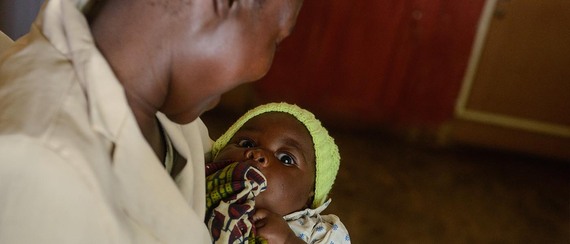As this year closes, it offers an opportunity to reflect on how far we've come and the work yet to be done.
Global health gains in the third millennium have been nothing short of
amazing. The last 15 years have experienced many highs and lows but
mainly highs, as mortality falls, the disease burden shifts, life
expectancy generally expands across the globe. Naturally these broad
trends disguise deep national and regional variability. But consider
these Global Health Milestones (plus an Honorable Mention) from the year
just ending: (Check out the five below and click the link at the bottom to
see the entire list.)
1. Ebola. We start with a low, rather than a high, as the world grappled with the most-deadly and extensive outbreak of Ebola hemorrhagic fever
ever, which killed tens of thousands in Liberia, Sierra Leone and Guinea, and the embers of which continue to smolder. Resilient health systems and resilient communities would have helped a get this epidemic under control much faster, but we confronted dangerously weak health systems and
struggling communities, and we saw the result. Lessons continue to be learned from the global response -- what could have been done sooner, how the WHO's own structure may have been an obstacle, how vital and tough the behavior change aspects of this or any epidemic can be. But against all odds, the ability of Nigeria's disease surveillance system, benefiting from years of investment in polio eradication, to quarantine and stop Ebola in Lagos shines as a great moment.
2. Eradication of malaria. Bill Gates doubled down on this bold approach this year, when he recognized that a piecemeal status quo response to this ancient killer may be a fool's game. "Eradication is the only sustainable solution to malaria," says Gates, co-chair and trustee of the Bill and Melinda Gates Foundation. "The alternative would be endless investment in the development of new drugs and insecticides just to stay one step ahead of resistance. The world can't afford that approach."
3. Early ARVs for Treatment and Prevention of HIV. The WHO's recommendation for immediate antiretroviral treatment for those diagnosed with HIV, and wholesale embrace of pre-exposure prophylactic ARV use for at-risk populations represents a sharp change in the global HIV and AIDS response, one that will drive incidence lower as we strain towards an AIDS-free generation on the way to ending the disease - but also presents the world with a significant challenge. Higher numbers of people needing to be on earlier treatment, faced with flat or declining funding from donors for the HIV/AIDS fight, means we must find a more sustainable and sensible way to ensure all who need treatment receive it.
4. TB the Top Infectious Disease Killer. This is a classic good news/bad news story - while TB incidence is declining slowly every year, stronger
advances against malaria and HIV deaths leave TB in the Number 1 Killer spot. As UN special envoy for TBV Dr. Eric Goosby noted this year, the fight against TB needs new resources not just for better drug development (hardly any new therapies in decades! Though some are in the pipeline
now), but also to address the critical underlying driver of TB across the world: poverty. The rise of so-called MDR and XDR TB -- multi- and extreme-drug resistant TB strains -- is cause for deep concern among us all, and the West and developed economies are in for a rude shock when it
becomes obvious that venerable old TB has not been consigned to the history books and literature. It's killing today.
5. Global Goals! The UN's embrace of the Sustainable Development Goals in September mark a major global consciousness moment, not just around health, but around all major aspects of human development. This isn't a
"them" challenge -- it's a "we" challenge, as the world community recognized the interdependence and inter connectedness of our broad development agenda. Improvements over the Millennium Development Goals (MDGs): the SDGs are universal in reach; and the private sector is explicitly implicated along with national governments and multinational organizations. Universal Health Coverage -- the recognition that all people everywhere should enjoy access to quality healthcare without financial hardship -- marches steadily to the fore in the context of the SDGs.
Honorable Mention: Cuba. The stage may be less than global, but Cuba's success in being the first country to eliminate mother-to-child transmission of HIV marks a notable Global Health moment nonetheless. Cuban healthcare achievements are undeniable.
Click here to read about more of the top global health moments of 2015.
